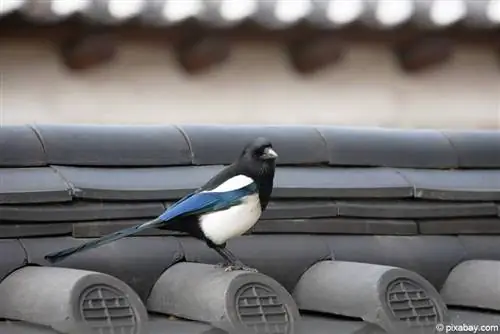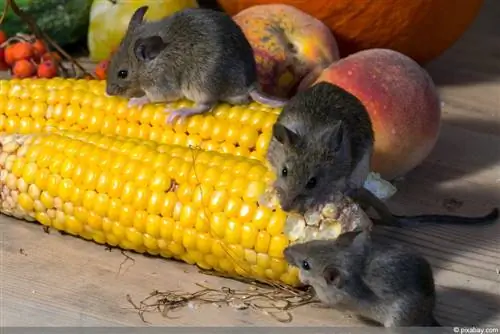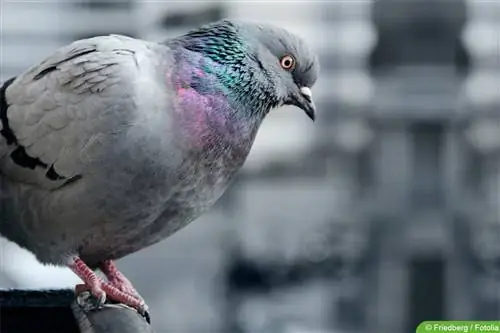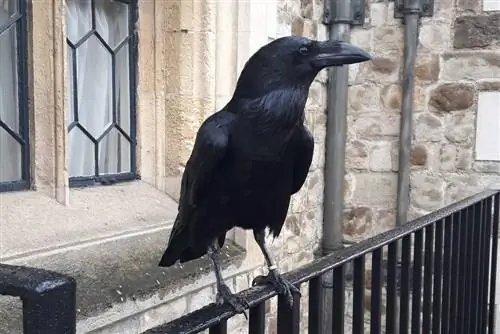- Author admin [email protected].
- Public 2023-12-17 03:39.
- Last modified 2025-06-01 06:48.
If magpies appear in the garden, conflicts are inevitable. The black and white corvids are traditionally considered pests and nest robbers. If you, as a concerned gardener, are looking for effective methods to drive away the notorious songbird killers, you could find yourself in trouble with the law. Magpies have been subject to the Federal Nature Conservation Act for many years. This does not mean that you have to hand your green empire over to the feathered terrorists. These instructions explain how you can legally and permanently keep magpies away from your garden.
Confusing legal situation - what is allowed and what is not?
Since the EU Birds Directive came into force in 1979, all European bird species have been subject to this protection, including the magpie. In 1994, however, this EU directive was expanded to include Appendix II/B, which lists various species that may be hunted in Germany outside of the breeding season. This listing includes magpies and other corvids. However, until 2006, the federal legislature refrained from including magpies in Section 2 of the Federal Hunting Act as a huntable species.
As a result of the change in the hunting season regulations at the state level, the magpie is now considered a huntable species in North Rhine-Westphalia and other federal states, for which tens of thousands of birds pay with their lives every year. Despite vehement pleas from the Nature Conservation Association (NABU), the black and white birds have continued to be listed as a huntable species since the amendment to the state hunting law in 2014 with a closed season from January 1st. March to July 31st.
For private individuals without a hunting license, the Federal Nature Conservation Act (BNatschG), according to which magpies are among the protected wild animals, applies. Accordingly, corvids of all species must neither be disturbed nor driven away or hunted and certainly not killed, regardless of the season. Furthermore, it is strictly forbidden to destroy the nests, damage the eggs or kill young birds.
If your garden is infested with magpies, you could theoretically instruct the responsible hunter to shoot them. Since hunting rights are suspended in densely populated areas, the classification of birds as huntable animals is pointless at this point. If magpies are undesirable on your property, other solutions are required that do not run counter to the Federal Hunting Act, the State Hunting Act, the Federal Nature Conservation Act and the EU Birds Directive.
Preventing conflicts instead of chasing away magpies - this is how it works
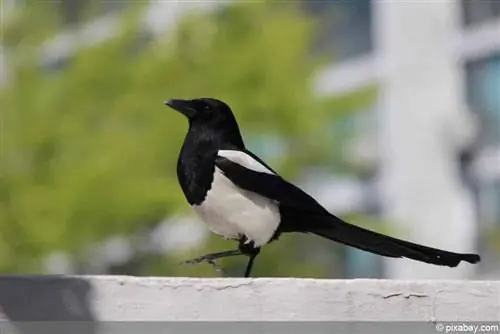
The Federal Nature Conservation Act prohibits the expulsion of magpies in any form. However, this regulation does not require you to make your garden inviting and comfortable for the terrorists in feathers. By taking the following precautions, your green kingdom will become so unattractive to the black and white corvids that conflicts will not arise in the first place:
- Don't leave leftover food lying around in the open
- Cover the compost with tarpaulins as a possible food source
- Do not dispose of kitchen waste in bags and leave it outside
- Replace or repair damaged garbage cans promptly
Keep small songbirds out of the reach of magpies by creating protected retreats. A thorny, evergreen hedge is perfect for tits, finches or blackbirds to build their nests in. Also hang up nesting boxes whose entry holes are too small for the corvids.
Natural enemies effectively ward off magpies
- Help from the animal kingdom? -
Magpies will avoid a garden if their natural opponents are there. Corvids are primarily afraid of dogs and cats as well as larger birds of prey. If you get your own dog or cat, the problem of annoying magpies in the garden will quickly become a thing of the past. Alternatively, simulate the presence of your four-legged friends by recording dogs barking or cats hissing and playing them repeatedly in the garden.
Note:
However, please note that cats' hunting instincts do not stop at other birds (songbirds). Ground-nesting birds, inexperienced young birds and all nests within reach are particularly at risk.
Don't underestimate the intelligence of corvids. If a dog doesn't show up every now and then, your strategy will quickly be exposed. So invite dog and cat owner friends over so that the animals can run through the garden. If you distribute additional tufts of cat or dog hair over the area and make the appropriate noises, you can outsmart the clever birds.
Among the birds of prey, the carrion crow and the hawk are among the most important predators of magpies. You can also effectively ward off magpies using a combination of replicas and calls from these feathered enemies. Therefore, place real-looking animal figures in the garden and let the cries of these birds sound again and again. Again, you should include the intelligence of magpies in the strategy. Only if your garden is designed in such a way that such a bird of prey could swoop down at any time can you count on successful defense. Therefore, thin out your trees regularly to create the impression of free flight paths.
Protect seedbeds from voracious magpies
Devastated seedbeds are a particular nuisance when a garden is part of magpie territory. The birds not only target the seeds, but also enthusiastically eat the seedlings and sprouting young plants. How to protect a freshly planted bed from leaf decay:
- After sowing, cover the bed with a close-meshed net
- Place small wooden sticks or special net holders into the ground at a distance of 40 to 50 cm
- Pull a bird protection net with a mesh width of 2-3 cm over the bed using the brackets and fix it in place
Alternatively, cover the bed to be protected. To do this, pull thin nylon or cotton cords crisscrossing the surface between the wooden sticks. This method has the advantage that you can maintain a greater distance from the ground than with a net. Young plants are therefore not hindered in their growth.
Tip:
Magpies are wrongly viewed as pests. Spiders, insects, mice, carrion and waste are at the top of the birds' diet, which makes them important beneficial organisms for ecological balance.
Habitat protection makes displacement irrelevant
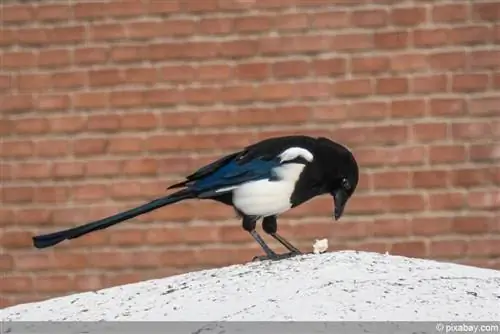
The increased occurrence of magpies in residential areas, gardens and parks is mistakenly interpreted as an explosive proliferation. In fact, the corvids were forced to leave their original habitats. After the Second World War, their previous homeland began to be systematically destroyed. Extensive agriculture, destruction of natural hedges, excessive use of pesticides and intensive persecution in the fields left the desperate birds no choice but to settle in close proximity to people. Valuable food sources are available here all year round, such as compost heaps, filled garbage cans, leftover food in ponds or run-over animals on the roads. The perception of magpies as a nuisance is not due to an increase in numbers, but rather to a population shift.
Only the restoration of the natural conditions can lead to a permanent withdrawal of magpies from residential areas and gardens. The black and white character birds can regain their habitat with the following measures:
- Avoiding pesticides in favor of ecological plant protection methods
- Specific creation of strips of trees and hedges as places of retreat
- Leave edge strips on water and fields
- Cultivation of crops in mixed culture instead of monoculture
Making your garden unattractive to magpies according to these instructions is only one side of the coin. By making a contribution to restoring the original habitat, discussions about chasing magpies out of private gardens will soon be a thing of the past. The options range from participation in the annual summer or winter count 'Hour of Garden Birds' to volunteer work in nature conservation associations.
Tip:
Scientific long-term observations have proven that magpies and other corvids could never endanger the population of songbirds. In fact, titmice, finches and blackbirds have been shown to achieve the highest settlement densities in the neighborhood of magpies. Humans are really responsible for the extinction of species.
Conclusion
Although magpies are subject to hunting law and more than 30,000 of these birds are shot every year in North Rhine-Westphalia alone, the birds in the garden are under protection. The Federal Nature Conservation Act prohibits chasing away magpies, destroying their nests or even disturbing the birds during breeding and moulting. Targeted defensive measures to prevent conflicts do not run counter to the regulations. Avoid possible food sources, protect your seedbeds and prevent small songbirds from accessing them, and make your garden unattractive to magpies. It becomes really uncomfortable for the nuisances when dogs and cats are on the property. On top of that, simulate the presence of carrion crows and hawks and keep magpies away from your garden permanently with this package of measures.

